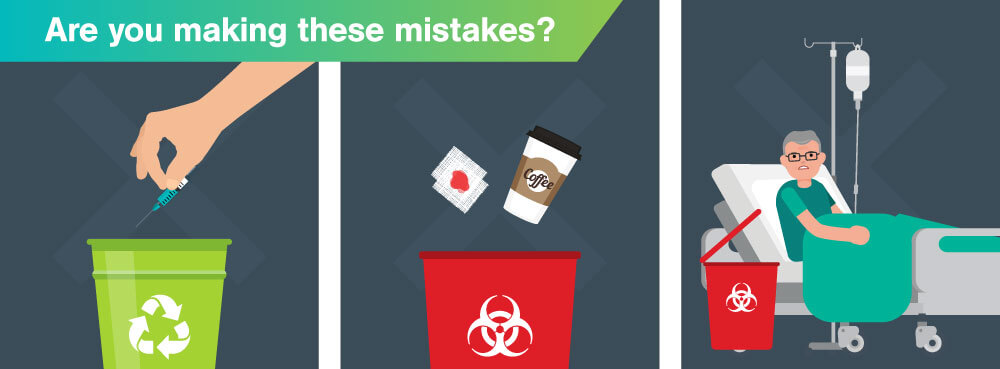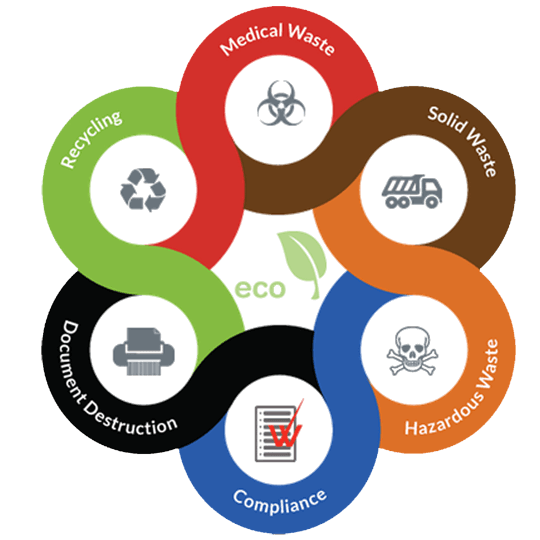Proper Disposal Methods for Clinical Waste
Appropriate disposal strategies for medical waste are of utmost value in ensuring the safety of both healthcare workers and the public. The suitable handling and disposal of medical waste is critical to prevent the spread of infectious diseases and the contamination of the environment. This includes the secure disposal of sharps, transmittable waste, and pharmaceutical waste. Complying with rigorous standards established by governing bodies is vital to maintain conformity with lawful laws and protect public wellness. This intro will certainly discover the value of appropriate clinical waste disposal, offer guidelines for dealing with different sorts of waste, and stress the demand for medical care facilities to embrace best practices. By following these guidelines, medical care companies can add to a more secure and much healthier atmosphere for all.
Importance of Correct Medical Garbage Disposal
Proper clinical waste disposal is of utmost value in order to avoid the spread of infections and shield public health and wellness. Clinical waste refers to any waste created throughout medical procedures or from the medical care sector. This waste can have infectious products, such as blood or bodily fluids, sharps, drugs, and other possibly hazardous compounds. If not gotten rid of correctly, clinical waste can present major threats to medical care workers, clients, and the basic public.
One of the key reasons for proper clinical waste disposal is to avoid the spread of infections. Medical waste can harbor different microorganisms, consisting of germs, infections, and various other microorganisms that can cause conditions. Inappropriate disposal can lead to the contamination of surfaces, water sources, and air, enhancing the danger of infections. By securely throwing away clinical waste, the opportunities of direct exposure to these virus are dramatically reduced, making sure the security of health care workers, clients, and the neighborhood at big.
Furthermore, correct medical garbage disposal is important for securing public health and wellness. Clinical waste that is not correctly managed can contaminate dirt, water bodies, and also food sources. This can lead to the transmission of conditions to humans and animals, positioning a considerable public health hazard (WasteX Medical Waste Disposal). By following correct disposal methods, such as partition, treatment, and control, we can minimize the possible dangers connected with medical waste and safeguard the wellness of the neighborhood.
Handling and Disposing of Sharps
When it pertains to the handling and disposal of sharps, adherence to correct protocols is vital for making certain the safety and security of medical care workers and avoiding the threat of injury or infection. Sharps include needles, syringes, lancets, and other items with the prospective to reduce the skin or penetrate. Due to their potential to transmit bloodborne pathogens, such as HIV and hepatitis B and C, it is important to get rid of and take care of of sharps properly.

Disposal of sharps containers need to comply with neighborhood guidelines and guidelines. It is best to make use of certified medical waste disposal solutions that specialize in the proper handling and disposal of sharps to make certain compliance with regulations and decrease dangers to healthcare employees and the environment.
Standards for Infectious Garbage Disposal
Contagious waste, likewise recognized as biohazardous or biomedical waste, refers to products that are possibly infected with transmittable representatives or various other unsafe materials. Correct disposal of transmittable waste is crucial to guarantee the safety and well-being of healthcare workers, individuals, and the basic public.
The guidelines for transmittable waste disposal vary depending on the nation and regional laws, however there are some usual practices that health care centers should comply with. All transmittable waste ought to be set apart from various other types of waste at the point of generation. Transmittable waste should be delivered and disposed of by licensed waste administration firms that specialize in handling biomedical waste.
It is essential for medical care facilities to have extensive training programs in position to educate personnel on the correct treatments for transmittable waste disposal. This includes training on waste segregation, storage space, and taking care of techniques. By complying with these guidelines, medical care facilities can efficiently handle contagious waste, minimize the threat of infections, and shield public wellness.
Ideal Practices for Drug Garbage Disposal
Drug garbage disposal need to constantly be performed frequently and in accordance with expert guidelines. Appropriate administration of pharmaceutical waste is vital to secure public health and wellness and the atmosphere. Pharmaceuticals can position a substantial threat otherwise taken care of appropriately, as they might pollute water sources, damage water life, and even contribute to the advancement of antibiotic resistance.
Among the most effective techniques for pharmaceutical waste disposal is to establish an assigned collection system within medical care centers. medical waste disposal service. This system needs to consist of different containers for various types of pharmaceutical waste, such as expired medicines, extra medications, and contaminated materials. These containers need to be plainly labeled and located in easily available areas to urge proper disposal by healthcare professionals
Furthermore, it is vital to educate health care team about the appropriate handling and disposal of pharmaceutical waste. Educating programs must concentrate on identifying different kinds of pharmaceutical waste, recognizing the associated threats, and complying with the appropriate disposal procedures. Routine reminders and updates ought to be supplied to make sure conformity with disposal standards.
Along with internal techniques, health care centers must likewise develop collaborations with licensed waste management firms. These firms focus on the collection, transportation, and disposal of pharmaceutical waste. By functioning with these experts, healthcare facilities can guarantee that their pharmaceutical waste is gotten rid of safely and in compliance with regional laws.
Compliance With Legal Regulations
In order to guarantee compliance with lawful regulations, it is critical for healthcare facilities to abide by proper disposal strategies for medical waste. Medical waste presents a considerable risk to public wellness and the setting, making it essential for healthcare centers to take care of and dispose of it according to the law.
Regulatory bodies, such as the Occupational Safety and Health And Wellness Administration (OSHA) and the Environmental Protection Company (EPA), have actually established standards and requirements for the appropriate disposal of medical waste - WasteX Medical Waste Disposal. These laws aim to shield healthcare employees, waste monitoring workers, and the public from possible dangers related to clinical waste

Non-compliance with legal guidelines can result in extreme consequences for health care centers, consisting of fines, legal liabilities, damage to reputation, and prospective harm to public wellness. Therefore, it is essential for healthcare facilities to remain updated with the current policies and continually monitor and improve their waste administration techniques.
Final Thought
To conclude, proper disposal methods for medical waste are important to guarantee the safety of healthcare employees, patients, and the environment. Following standards for internet managing and disposing of sharps, contagious waste, and pharmaceutical waste is crucial. Compliance with lawful laws is essential to avoid the spread of infections and shield public health. It is critical that healthcare facilities maintain strict procedures for the correct disposal of clinical waste to lessen threats and maintain a secure medical care environment.
Medical waste refers to any waste produced throughout clinical treatments or from the medical care market. Contagious waste, also recognized as biomedical or biohazardous waste, refers to products that are potentially polluted with contagious representatives or various other harmful compounds. All contagious waste needs to be segregated from other kinds of waste at the factor of generation. Transmittable waste should be transferred and disposed of by licensed waste monitoring firms that specialize in managing biomedical waste.
Sticking to guidelines for disposing and dealing with of sharps, contagious waste, and pharmaceutical waste is vital. (medical waste disposal service)